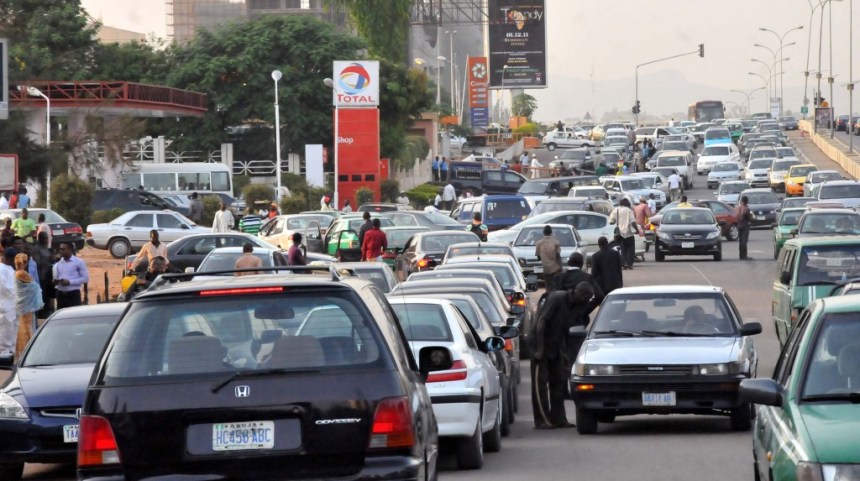The FCT’s present fuel scarcity, according to the Association of Distributors and Transporters of Petroleum Products (ADITOP), is due to the high cost of Automotive Gas Oil (AGO) used by petroleum tankers and the low freight rate.
News Agency of Nigeria
The AGO, also known as diesel, is presently being sold at N700 per litre, up from N290 per litre earlier.
On Wednesday, ADITOP President Alhaji Lawal Danzaki told the News Agency of Nigeria (NAN) in Abuja that transporters could not afford the high cost of diesel to fuel vehicles for PMS shipment.
According to NAN, gasoline lineups appeared unexpectedly in Abuja on Sunday and have remained as a result of a scarcity of Premium Motor Spirit (PMS), often known as petrol, in several sections of the city.
Low load-outs owing to recent extended holidays and increased fuel sales, according to the Nigerian National Petroleum Company Limited (NNPC Ltd.), triggered the unexpected scarcity.
Although the NNPC Ltd. had adequate PMS in its Lagos facility, Danzaki informed NAN that petrol tankers and marketers lacked diesel to power their vehicles to transport the products, resulting in the current fuel constraint.
He said that the carriers were at a loss and couldn’t keep their vehicles running because of the high cost of diesel.
Transporters and tanker owners were finding it difficult to fuel their vehicles to deliver PMS to other regions of the nation, he claimed, because of the current situation.
The PMS was accessible in the Lagos depot, according to Danzaki.
“My truck that is loading from Lagos to Suleja, Niger State depot, will consume 800 litres of diesel to run from Lagos to bring petroleum products to Abuja but because of the high price, the truck cannot operate.
“It is also similar to the Aviation fuel called Jet A1, the price is very high currently, and that is why that sector is experiencing difficulty to operate.
“The refineries are not working, so government relies on importing the diesel and petrol.
“If the refineries are working, we can get PMS from Kaduna refinery at a cheaper rate than going to Lagos to transport the product,” he said.
The high cost of AGO, according to the ADITOP head, is a result of global oil distortion caused by the Ukraine and Russia crises.
Another reason contributing to the high cost and unavailability of fuel, which is a deregulated product, according to him is the naira’s depreciation.
“The marketers who are importing the diesel are getting their dollars from black market, so they are buying it at high price and the price of crude have gone up, so they buy the refined one at high rate.
“The NNPC has to import in abundance and give us an affordable quantity of diesel to fuel our tankers, then we will bring petrol from Lagos to any part of the nation.
“This scarcity started in Abuja because Abuja consume a lot of fuel more than any other state.
“The four towns that consume fuel a lot are Abuja, Port Harcourt, Lagos and Kano.
“Abuja is facing this problem because a lot of fuel is being pushed to Abuja because of high demand, that is why you see queues of almost two kilometres in fuel stations,” he added.
He urged the Nigerian Midstream and Downstream Petroleum Regulatory Authority (NMDPRA), which is in charge of petroleum product pricing patterns, to modify the price of AGO to reflect the freight paid by the government as an equalisation fund.
“The NMDPRA does not increase our freight rate and the AGO being used to transport other petroleum products has gone up in price, so there is no gain at all in the business.
“In order to solve this scarcity, government must intervene in two ways, either to increase the freight rate being given to petroleum transporters according to the distance or give the diesel at affordable price,” he said.
According to him, the government has been making efforts by progressively paying the ADITOP, but it wants the government to pay generously by increasing the freight rate so that petroleum marketers may be fairly compensated and avoid operating at a loss.
He said that stakeholders were also pressuring the government to repair and develop additional refineries.
“The refineries are outdated because they were built about 42 years ago and the population has increased and the demand of petroleum has also increased but we rely on importation, making it difficult for people”.
Meanwhile, an NMDPRA official who spoke on the condition of anonymity said the government was working to pay freight rates to petroleum marketers, and that a committee was now looking into the matter.
Related posts
Senator Clement Annie Okonkwo Dies at 63
Reviews
Follow Our Activities On Facebook
6 hours ago
11 hours ago
14 hours ago
14 hours ago
15 hours ago
SUBSCRIBE
[mc4wp_form id=”2012″]
Top Reads!
#BigBrotherNaija “Level Up” Week 6
Though last Sunday Sunday was meant to be a “no-eviction” day, it came as a shocker when fake housemate, Modella…
Dating in 2022; Situationships Are Not For The Fainthearted
Situationships are defined as that space between a defined relationship and something other than a friendship. It is a romantic…
20 Questions With Dinta Media’s Visual Storyteller, Chimeremogo Nwoke
Dinta Media is not really just a media production brand but we like to see ourselves as a hub for…
How Are Nigeria’s Small Businesses Coping?
The current rising rate of inflation and other burdens against the Nigerian economy speaks to the realities of the times.
Thrifting Is All The Rave Now, Here’s Why
By Amy Adindu The affordable clothing movement has gained global attention and acceptance as we’re all trying to look like…
#BigBrotherNaija “Level Up” Week 2
Week 2 of the highly watched Nigerian TV show kicked off with an early plot twist. On Sunday, Big Brother…
#BlueTunes: Burna Boy, Omah Lay Top Album Picks For July
July was a promising month for music lovers; from Lizzo’s album titled Special and Imagine Dragons’ Mercury, (Acts 1 &…
#BlueTunes Album Picks For June
Gbagada Express – Boj Bolaji Odojukan, popularly known as BOJ, was raised both in England and Nigeria. He shot to…
“A Creative’s Dream” with Jeff Chinonso
On the 26th of June 2022, Jeff Chinonso hosted his first solo art exhibition. The Augmented Reality exhibition themed “A…
Nigerian API-based company Thepeer raises $2.1 million
Tech infrastructure startup Thepeer has raised a $2.1 million seed round according to a report from TechCabal. Thepeer, a Nigerian…
Dika Ofoma, Ugochukwu Onuoha take on grief in Debut Film “The Way Things Happen”
The twenty-minute film focuses on the loss of a loved one, and how grief changes a person.
Nigerian Startups might just be Crippled by a Recently Leaked bill
Over the years there has been talks of amendment on the 2007 Act of the National Information & Technology Agency (NITDA).
Why We Love Kelechi Amadi Obi
The definition of talent is Kelechi Amadi’s iconic story. Imagine a person who studies law in school, gets called to Bar, and leaves it all for something different and unrelated…Painting!

















